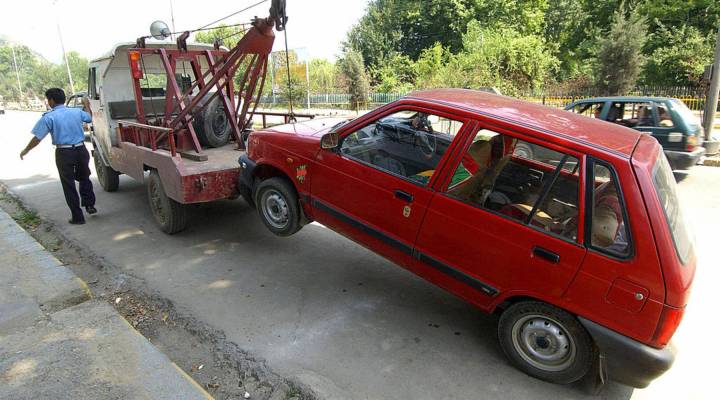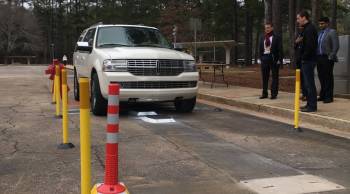
What happens to abandoned cars

This is just one of the stories from our “I’ve Always Wondered” series, where we tackle all of your questions about the world of business, no matter how big or small. Ever wondered if recycling is worth it? Or how store brands stack up against name brands? What do you wonder? Let us know here.
Listener Cinthia Bonilla sent in this question:
When cars, boats, campers or any other vehicle is left on the side of the highway and nobody picks it up who pays for its removal? If nobody claims it, can the highway authority sell it to use the funds to better the roads? Where do these forgotten vehicles end up?
At first, this seemed like an easy set of questions to answer — except for the fact that roads and things found on the side of them fall under a number of different government agencies and bureaucracy is anything but simple. Who is responsible and where funds end up also varies depending on the state.
Let’s break this down question by question:
When cars, boats, campers or any other vehicle is left on the side of the highway and nobody picks it up who pays for its removal?
Our first attempt to answer this question took us to the U.S. Department of Transportation. According to them, the responsibility to keep roads clean falls to state and local level officials.
“Each state has a slightly different process, but — in general — items like the sort you describe are collected by the state highway patrol and disposed of,” said Doug Hecox, spokesman for the department. “This is also true of road kill — animals struck and killed by vehicles. Keeping the highways and the clear-zone on either side free from accumulated obstructions is an ongoing responsibility of state highway patrols.”
Whether the responsibility falls to the state or the local government depends on what kind of the road it is. For example, highways would fall under the state’s highway patrol while local roads like those in your town would fall under the supervision of the local government.
Let’s take a look at New York City, where local street removal is the responsibility of two city agencies.
“Abandoned/stolen non-derelict vehicles are towed by the New York Police Department. Derelict vehicles are towed by the Department of Sanitation,” Alana Morales, spokeswoman for the New York City Department of Transportation, told Marketplace.
A derelict car is any car that’s missing parts, has any exterior or interior damage, had been burned or is eight years or older, according to Belinda Mager, the director of digital media and communications at the Department of Sanitation of New York (DSNY). Additionally, the car must be without license plates.
“Private tow and scrap yards are contracted by DSNY to remove the vehicles. We receive a fee for each vehicle removed,” Mager said.
The proceeds from scrapping the vehicle are used to pay for the removal — the towing and any potential storage.

A tow truck drivers walks past the damaged car.
Things are not that different in our other example, California, where we explored removals from highways rather than local roads.
“If the California Highway Patrol (CHP) officer comes upon a car that is abandoned, a notice is placed on the vehicle. The driver or registered owner must remove the vehicle from the roadway within four hours. If the vehicle is not removed, the vehicle is stored at a tow yard,” said Mike Martis, Jr., a CHP spokesman.
If the car is registered, the CHP notifies the owner about where their car is and how to retrieve it. When the owner picks up the car, they will be asked to pay the towing and storage fees. If the owner does not turn up within 30 days, “the tow yard begins the steps to auction off the vehicle,” said Martis. The funds are then used to cover the towing and storage fees for the car.
| Are smart cars only as good as the roads they’re driving on? |
| Let’s build infrastructure, but we better make it smart |
Where do these forgotten vehicles end up?
As mentioned above, many of them tend to be towed and stored for a specific period of time. Afterward, they are either sold for scrap or sold at an auction.
If nobody claims it, can the highway authority sell it to use the funds to better the roads?
Probably the most direct answer to this particular question came from the California Department of Motor Vehicle.
“Abandoned vehicles are not a reliable source of revenue,” said Marty Greenstein, public information officer at the California DMV. “Their sale would barely cover the cost of towing, storing, and crushing them, let alone the cost of then selling them for reuse.”
In California, when abandoned cars — whether they were found on the road, in a garage, in someone’s storage — are sold at a lien sale, the proceeds are divided as follows: a portion goes to cover any towing costs, another portion to cover storage costs that might have been incurred and then the remainder is sent to the California Department of Motor Vehicles, not the local highway patrol.
Here is how much money the Department has received from such sales over the past three fiscal years:
- FY 2014-15: $1,023,264
- FY 2015-16: $620,555
- FY 2016-17: $917,283
So what does the DMV do with that money?
“The DMV doesn’t use those funds since they belong to the vehicle owners who had their cars sold at a lien sale,” Greenstein said. As for how much of that money goes unclaimed, he couldn’t say. “We don’t have any historical data on the rate at which those funds go unclaimed.”
To summarize: most of the cars found on the side of the highway are not worth much and the proceeds from the cars that are worth selling are usually put aside just in case their owners turn up.
We tried to track down similar data in New York only to have the New York State DMV tell us that it “does not receive financial compensation from the sale of abandoned vehicles. The sale of vehicles goes directly to the local towns, cities and other municipal authorities involved.”
If you know what happens to abandoned cars in your town/city, let us know in the comment section below.
| Where do infrastructure dollars produce the most gain? |
| A lot of people are worried about crumbling infrastructure |
There’s a lot happening in the world. Through it all, Marketplace is here for you.
You rely on Marketplace to break down the world’s events and tell you how it affects you in a fact-based, approachable way. We rely on your financial support to keep making that possible.
Your donation today powers the independent journalism that you rely on. For just $5/month, you can help sustain Marketplace so we can keep reporting on the things that matter to you.


















